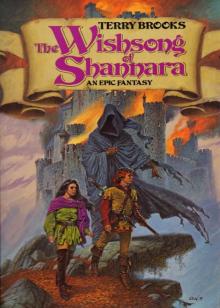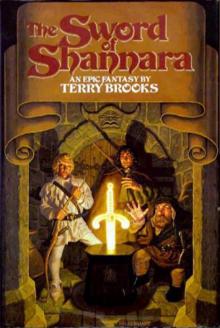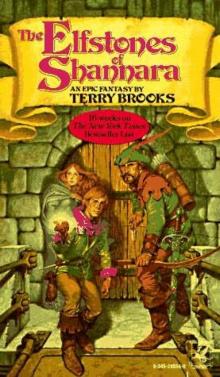- Home
- Terry Brooks
The Skaar Invasion Page 29
The Skaar Invasion Read online
Page 29
Footsteps coming up behind him caught his attention. He turned.
“Commander,” Edeus Pressalin called out, approaching at a quick trot, a determined look on his rugged face. An aide and a bowman accompanied him, but as they neared the first commander, Pressalin gestured for both to fall back. Whatever had brought him in such a hurry, he wanted to be alone with his superior to reveal it.
“Fresh news?” Dresch queried as the other came to a stop before him.
Without a word in response, his subcommander handed him a tiny rolled piece of paper. Dresch took it from him, unfolded it, and gave the contents a quick read:
Arraxin Dresch,
First Commander of the Federation Army
Enough of this nonsense with the Skaar. Engage and destroy.
Leave no survivors. An example is needed.
Deploy soldiers at first light. Attack at dawn.
Ketter Vause, Prime Minister
At the bottom of the page, the official seal of the Prime Minister had been imprinted.
“An arrow shrike carried it. It landed on one of the roosts we use for our birds while in the field.” Pressalin was breathing hard. He must have run the whole way. “This one just arrived a few minutes ago. I read the message, saw what it meant, and came directly here.”
Arraxin Dresch nodded, reading the message again. “This was one of our birds?”
“It must have been. According to the trainer who watched it land, it flew in from the south.” Pressalin gave him a look. “You’re worried it might not be genuine? That it might be a Skaar trick?”
“It had crossed my mind.”
“It bears Vause’s seal. How could they get their hands on that?”
Dresch shook his head. “I don’t want to take anything for granted where the Skaar are concerned.”
“But what reason would they have for inviting an attack on their fortifications? What would be the point? We outnumber them five to one and they are cut off from their homeland and any reinforcements. It doesn’t make any sense.”
Doesn’t it? Arraxin Dresch wondered. That princess was bold in a way few he had encountered had even thought of being. Still, his subordinate had a point. Whatever else might or might not be true, there was no denying that the strength of the Federation advance force was far superior to that of the Skaar.
And there was no denying the authenticity of the message. The seal was genuine and the handwriting was Vause’s—even if the decision seemed a departure from what he expected of the normally cautious-to-a-fault Prime Minister. But there was also the matter of the duty he owed to those who commanded him. If he was given an order, he was expected to obey it. Vause had put him in his present situation exactly because he had a history of doing what he was told without arguing or complaining. And now seemed a bad time to change that.
Besides, if he was to be completely honest with himself, he wanted the Skaar dead and buried, too. He wanted them gone from his life and from his country. The longer they stayed around, the more uncomfortable he felt. Smash them now, as ordered, and the discomfort and threat would both go away.
“Find Murian,” he ordered. “Order a mobilization of the transports and warships for two hours before dawn. We will board just before sunrise and set out for the Skaar fortifications. We’ll come at them on the flanks and roll them up from either end. Flash rips and cannons from the air, then soldiers on the ground to finish the job. Leave one company here to ward against a river crossing—although I cannot imagine anyone navigating the Mermidon in its present condition. Now go.”
He watched as Pressalin and his companions hurried away, Edeus already giving orders and gesturing for quick action. Arraxin Dresch shook his head. Quick action wasn’t needed now. It might not even be needed later. Quick thinking, maybe, if matters took a dramatic turn. The Federation commander yawned. He needed to get some sleep, but that wasn’t likely to happen anytime soon. He never slept more than a couple of hours a night when he was in the field. But he might be home sooner than he expected if their strike on the morrow did the damage he expected, and he could catch up on his sleep then. Still, it was never a good idea to anticipate success. Fate had a way of fooling you when you did—and never in a pleasant way.
He stood for a few moments longer, watching Pressalin and then looking off toward the far bank of the river once more. Watch fires weren’t even lit yet. The gloom of night was approaching. A mistiness rising off the warm earth and a steady drop in temperature partnered to form a heavy brume that was steadily thickening. He couldn’t see any sign of movement among the Skaar ranks. He was struck by a disconcerting suspicion that his enemy had simply disappeared.
He signaled to Rijer and Anstase. “Let’s go have a look at our airships and make sure they are ready for what’s to come.”
Without waiting for a reply, he departed the hilltop and moved toward the airfield farther inland. As always, movement helped ease his momentary concerns. His worries faded along with the last few rays of sunlight, and night settled in.
* * *
—
At exactly two hours before dawn, the night still black beneath a heavy layer of storm clouds and the air chill and smelling of rain, both companies that made up the Federation advance force began to mobilize. The men and women who filled their ranks woke quietly, dressed in darkness, armed themselves, and moved into previously designated positions on either side of the airfield, back where their huge transport and sleek black warships awaited boarding. They did so swiftly and efficiently, well trained for such contingencies, so all knew in advance what to expect and how to behave.
One-third of those assembled were dispatched to staff the defensive lines along the south bank of the Mermidon, there to settle in and keep watch for any sort of counterstrike by the Skaar, either before or during the Federation attack. The orders had been given, and the entire advance force was already anticipating an end to the Skaar threat.
Across the river, everything was quiet. Watch fires burned, but otherwise there was no sign of activity. The arrival of the anticipated rainstorm had blocked the light of moon and stars, and now the first raindrops were beginning to fall.
Standing with Subcommanders Croix and Pressalin, First Commander Dresch glanced at the sky and momentarily considered holding off until the storm had passed, even if it meant attacking in daylight. But at the end of his deliberation, he brushed aside his concerns. A little rain would hardly interfere with the maneuvering of his warships or the use of his flash rips, and the storm might even pass by entirely in the next two hours.
But things did not work out that way. The storm struck with an hour still left before sunrise and his soldiers not yet aboard their transports. And the rain was heavy—a deluge that drenched everyone to the skin. Winds howled and the waters of the Mermidon churned wildly, and the storm did not pass on as hoped, but hung around for another hour.
It was still pouring when the soldiers were given orders to board, and the slow, steady process of bringing nearly four thousand men aboard transports and warships commenced. Croix and Pressalin took command of one company each, boarding separate transports to be with their men, leaving Arraxin Dresch standing alone with Anstase and Rijer. The first commander would wait until the other airships were launched and then follow in his own much smaller craft, observing the attack from this side of the river. For the remainder of the fleet, it would be a swift crossing to meet the Skaar enemy. The warships would swing around to the ends of the defensive line and roll it up with weapons from the air. Transports would then fly farther inland to selected landing sites to unload their foot soldiers so they could pin the hapless Skaar between themselves and the river. In the end, the entire enemy force would be annihilated. It was the plan Dresch had determined had the best chance of success.
Except he was wrong.
The Skaar were one step ahead of him.
The transports, slow and ponderous, were to lift off first so that they could get under way and reach the river just as the warships came up to ward them on either side. But as the first of the transports—the one that Subcommander Edeus Pressalin had chosen to board—rose into the clouded, rain-filled sky and reached an altitude of just under a thousand feet, its diapson-crystal-powered engines began to fail. They did so without warning and not all at once, so that the airship lurched ahead for a few minutes longer, shuddering as it tried to stay aloft. But by then, the vessel was lost from view to those still on the ground, hidden by low-hanging clouds and engulfed by the rainstorm’s deluge. One by one, its engines ceased functioning, but the vessel continued forward under the faltering power of a sole remaining engine until that one, too, failed entirely and the airship plummeted into the murky waters of the Mermidon. It struck with stunning force, and hundreds were killed by the impact alone. Others made it into the river and were quickly caught up in the pull of the rapids and drowned. Of those who stayed afloat, a few lost their sense of direction, swam to the wrong bank, and died on its shores. Edeus Pressalin was among them. Skaar soldiers who cared nothing for his rank or his value to them hauled him from the water, spread-eagled him on the rain-soaked earth, and cut him to pieces.
Those few who made it back to the south shore—no more than two hundred of the nearly fifteen hundred who had filled the ship’s hold—found the Federation encampment in chaos. The remainder of the Federation airships had either tumbled from the sky or exploded shortly after their thrusters were engaged. No one knew the actual cause, although educated guesses were that either the diapson crystals in use had overheated due to a blockage of their parse tube exhausts or the replacement crystals stored in the holds of the airships had ruptured. In either case, the consequences were the same. Every remaining vessel either caught fire amid incendiary explosions that engulfed and destroyed them while they were still on the ground, or lost power when their engines failed on liftoff and crashed.
First Commander Arraxin Dresch watched in horror and disbelief as the first of the transports lost power and fell away into the river, and as the remainder of his fleet turned to tinder and ash when they began to explode. He was in a daze when his guards dragged him to safety. The four thousand men and women aboard those transports and warships were killed in minutes. Only a handful escaped. The carnage was indescribable. Some of those caught in the conflagration that engulfed the warships fought their way free of their doomed vessels while on fire, burning as they sought a safety that couldn’t be found. Some fell out of the sky, thrown from the transports, helpless to save themselves. But most died while still aboard, unable to get clear.
Arraxin Dresch watched and tried to process what he was seeing and could not. Any semblance of command disappeared. All around him, his soldiers were dying by the hundreds and his airships were falling to pieces. Of Pressalin and Croix, he knew nothing. Their fates were already decided, but he was unaware of this.
At the river’s edge, a new battle was beginning, but the Federation first commander could not know that it was between those Federation soldiers manning the defensive line and the unfortunate survivors of the first transport who had made it clear of their fallen airship and swum for safety. The latter were mistakenly seen as members of a Skaar attack and summarily slaughtered by their fellows. In the darkness, the smoke and ash and the rain and mist, it was impossible to tell who anyone was. Federation soldiers were killing one another because no one knew who was friend or foe. By the time anyone realized the mistake, most of those around them were already dead.
Screams filled the night. Howls of despair and cries for help rose from everywhere, and amid the chaos the terrifying explosions continued while the blanketing hiss of the heavy rain fell. Confusion was rampant, and order broke down at every turn. Survivors had no clear idea of what had happened and were seeing enemies everywhere they looked—even when they looked into the faces of their fellows.
And then the Skaar attacked.
* * *
—
Kol’Dre led the assault from the left flank of the Federation encampment while Ajin led the attack from the right. The Skaar had come across the Mermidon in separate units of two hundred soldiers each at dusk the day before, one choosing a point of crossing more than ten miles downstream, and the other crossing ten miles upstream from their enemy, doing so in small numbers so there would be no chance of discovery. When night arrived, both units had moved into place so they were well behind Federation scouts watching the river and its banks, in place for what they already knew was going to happen.
It had been Kol’s plan to send First Commander Dresch the false message. He had stolen a seal and a handwritten note off the Prime Minister’s desk during his visit a week earlier, and he could forge a false response accurately. Stealing one of the Federation’s arrow shrikes from their pens, which were left unguarded in the false belief that no one would attempt the theft of a bird, was simple enough when you could render yourself invisible.
Ajin had approved his plan. She knew from experience that if there was to be a Federation attack, it would either come at dawn or, if the approaching storm settled in, be postponed until the weather improved. The Skaar only needed to be in place and ready to thwart it. It was a gamble to send soldiers across the river and set them in place the night before, but a gamble worth taking. It was a stroke of luck that the first commander had chosen to ignore what should have been common sense and engaged while the storm was still in progress. The concealment offered by the clouds and rain had worked in favor of the Skaar, giving them exactly the cover they had sought.
During the night, a handful of scouts led by Kol’Dre had crept into the camp, invisible to the eyes of the few Federation soldiers who were keeping watch or loitering about the airships. Boarding the warships unseen, they had blocked the parse tubes so they would overheat, and replaced all but a few of the sound diapson crystals in the transports with ones that were cracked. It had only required that the engines be engaged and the thrusters for lifting off be fired for the crystals either to explode as they overheated or simply to fail mere minutes after liftoff.
After the airships were destroyed, chaos enveloped the Federation encampment, and the chain of command that all armies relied on crumbled completely.
The orders Ajin d’Amphere gave were clear. The Skaar would emerge from hiding once the explosions were complete, swoop down on the disoriented and frightened soldiers, and begin the slaughter. The orders given to the separate units of the advance force were simple. Everyone found in the camp was to be killed. Not a single Federation soldier—man or woman, injured or healthy—was to be spared. The destruction was to be complete—an object lesson to the Federation that they had underestimated the power and experience of the Skaar, and that in spite of superior numbers they could not save themselves. Their false confidence in the strength of their army had undone them, and they would be undone again if the Skaar chose to come after them.
“What do you anticipate this will achieve?” Kol’Dre had asked her as they split up to lead their separate units. “Besides the obvious, of course. You’re hoping for something more, aren’t you?”
He was correct, as usual. Insightful, her Penetrator. She had smiled and nodded. “I want my father to acknowledge my ability to lead,” she admitted. “I want him to see how invaluable I am. I want whatever doubts Sten’Or has created with his treacherous reports to be proved false. I want to persuade him to place me in command of the larger army he will most certainly be bringing with him, and allow me to finish what I started.” She paused. “I want to keep him from finding a reason to dismiss me as his legitimate child and heir. Most of all, I want to reduce the influence of the pretender who has taken my mother’s place in his bed.”
“Which you think will happen if you succeed?”
“The pretender has sought to put an end to my mother from the be
ginning, so undermining her is necessary. A victory here, resulting in a new home for the Skaar people, would negate her influence considerably.” She paused, seized his shoulders, and looked him in the eye. “What other reasonable choice do I have?”
Kol’Dre knew better than to attempt an answer to that question. Once Ajin had made up her mind about something this extreme, it was best to just stay out of her way. Besides, she might well be right in her assessment of the king’s response. Cor d’Amphere was a hard man, but he valued success and loyalty. If his daughter could give him that, he might forgive her for losing Paranor and its treasures. He might accept everything that had happened since their arrival as the natural course of things and look to the promise of what was to be gained if he let his daughter follow through.
They parted company then, each going to a separate command to prepare for the events that would follow with the coming dawn.
* * *
—
And now those events had come to pass, and Ajin d’Amphere led her soldiers into battle from the right perimeter of the Federation encampment, blades drawn and ready. Those Federation soldiers still alive—dazed and disoriented and in many cases already injured—put up little resistance. They died by the dozens, most cut down before they even knew what was happening. The rain continued to fall in sheets, and the ground was soon soaked with comingled water and blood. The Skaar worked their way through the survivors with mechanical precision, maintaining lines that swept up everyone in their path. When the lines met, they split apart again, and one half of each unit was sent down to the river to attack the defenders entrenched at its edge. Coming up on the Federation soldiers from behind, they found them still waiting for orders, and—unable to see their attackers until they were upon them—these unfortunates were dispatched as swiftly and thoroughly as their fellows.

 The Talismans of Shannara
The Talismans of Shannara The Sword of Shannara: The Druids' Keep: The Druids' Keep
The Sword of Shannara: The Druids' Keep: The Druids' Keep Witch Wraith
Witch Wraith The Elf Queen of Shannara
The Elf Queen of Shannara The Weapons Master's Choice
The Weapons Master's Choice The Scions of Shannara
The Scions of Shannara Armageddon's Children
Armageddon's Children The Sword of Shannara Trilogy the Sword of Shannara Trilogy
The Sword of Shannara Trilogy the Sword of Shannara Trilogy The Darkling Child
The Darkling Child The Black Unicorn
The Black Unicorn The High Druid's Blade
The High Druid's Blade Wards of Faerie
Wards of Faerie The Tangle Box
The Tangle Box The Black Elfstone
The Black Elfstone The Black Irix
The Black Irix The Elfstones of Shannara
The Elfstones of Shannara The Magic Kingdom of Landover Volume 2
The Magic Kingdom of Landover Volume 2 Bearers of the Black Staff
Bearers of the Black Staff Jarka Ruus
Jarka Ruus The Druid of Shannara
The Druid of Shannara The Sword of Shannara
The Sword of Shannara The High Druid of Shannara Trilogy
The High Druid of Shannara Trilogy Angel Fire East
Angel Fire East The Gypsy Morph
The Gypsy Morph The Wishsong of Shannara
The Wishsong of Shannara Magic Kingdom for Sale--Sold
Magic Kingdom for Sale--Sold Running With the Demon
Running With the Demon Wizard at Large
Wizard at Large The Sorcerer's Daughter
The Sorcerer's Daughter Imaginary Friends
Imaginary Friends The Elves of Cintra
The Elves of Cintra Tanequil
Tanequil Witches' Brew
Witches' Brew The Sword of the Shannara and the Elfstones of Shannara
The Sword of the Shannara and the Elfstones of Shannara The World of Shannara
The World of Shannara A Princess of Landover
A Princess of Landover A Knight of the Word
A Knight of the Word Straken
Straken The Skaar Invasion
The Skaar Invasion The Measure of the Magic: Legends of Shannara
The Measure of the Magic: Legends of Shannara Ilse Witch
Ilse Witch Bloodfire Quest
Bloodfire Quest The Stiehl Assassin
The Stiehl Assassin Antrax
Antrax The Last Druid
The Last Druid Paladins of Shannara: Allanon's Quest
Paladins of Shannara: Allanon's Quest Sometimes the Magic Works: Lessons From a Writing Life
Sometimes the Magic Works: Lessons From a Writing Life Wards of Faerie: The Dark Legacy of Shannara
Wards of Faerie: The Dark Legacy of Shannara Indomitable: The Epilogue to The Wishsong of Shannara
Indomitable: The Epilogue to The Wishsong of Shannara Heritage of Shannara 01 - The Druid of Shannara
Heritage of Shannara 01 - The Druid of Shannara Star Wars - Phantom Menace
Star Wars - Phantom Menace The Dark Legacy of Shannara Trilogy 3-Book Bundle
The Dark Legacy of Shannara Trilogy 3-Book Bundle The Bloodfire Quest
The Bloodfire Quest The Hook (1991)
The Hook (1991) Star Wars: Episode I: The Phantom Menace
Star Wars: Episode I: The Phantom Menace Street Freaks
Street Freaks The Sword of Shannara & Elfstones of Shannara
The Sword of Shannara & Elfstones of Shannara The Magic Kingdom of Landover , Volume 1
The Magic Kingdom of Landover , Volume 1 The Phantom Menace
The Phantom Menace Unfettered
Unfettered Allanon's Quest
Allanon's Quest Paladins of Shannara: The Weapons Master's Choice
Paladins of Shannara: The Weapons Master's Choice Terry Brooks - Paladins of Shannara - Allanon's Quest (Short Story)
Terry Brooks - Paladins of Shannara - Allanon's Quest (Short Story) Star Wars Episode I: The Phantom Menace (star wars)
Star Wars Episode I: The Phantom Menace (star wars) Warrior (The Word and the Void)
Warrior (The Word and the Void) Word & Void 03 - Angel Fire East
Word & Void 03 - Angel Fire East![[Magic Kingdom of Landover 05] - Witches' Brew Read online](http://i1.bookreadfree.com/i2/04/05/magic_kingdom_of_landover_05_-_witches_brew_preview.jpg) [Magic Kingdom of Landover 05] - Witches' Brew
[Magic Kingdom of Landover 05] - Witches' Brew The Magic Kingdom of Landover - Volume 2
The Magic Kingdom of Landover - Volume 2 The Measure of the Magic
The Measure of the Magic The First King of Shannara
The First King of Shannara Sometimes the Magic Works
Sometimes the Magic Works The Sword of Shannara, Part 2: The Druids' Keep
The Sword of Shannara, Part 2: The Druids' Keep The Sword of Shannara tost-1
The Sword of Shannara tost-1 Paladins of Shannara: The Black Irix (Short Story)
Paladins of Shannara: The Black Irix (Short Story) Tangle Box
Tangle Box Word & Void 02 - A Knight of the Word
Word & Void 02 - A Knight of the Word The Sword of Shannara, Part 1: In the Shadow of the Warlock Lord
The Sword of Shannara, Part 1: In the Shadow of the Warlock Lord The Wishsong of Shannara tost-3
The Wishsong of Shannara tost-3 The Elfstones of Shannara tost-2
The Elfstones of Shannara tost-2